When Outward Bound crossed the Atlantic from Britain to the U.S. over 50 years ago, there weren’t many jobs available in the outdoors. Since the 1960s, we’ve seen tremendous expansion in the conservation movement, environmental education, outdoor schools and outdoor adventure. Today you might find yourself teaching children about the natural world, protecting special places from development, leading groups on wilderness expeditions, or guiding vacationers on rafting trips. A world of options are available; so how do you know which path to follow?
Start at the Beginning
1. Plan ahead. Many jobs in the outdoors are seasonal. At Outward Bound, hiring begins in winter for summer positions, and interviews and contract offers take place early in the year. If you snooze, you lose!
2. What’s your goal? Just as on an expedition, it’s helpful to have an idea of where you want to go. The journey may take unexpected twists and turns, but you need a path to start on, a trailhead so to speak, and an idea of where you’d like to end up.
Would you like to work in conservation? Conservation jobs can include working with volunteers, trail work, scientific research, teaching ecology, and more.
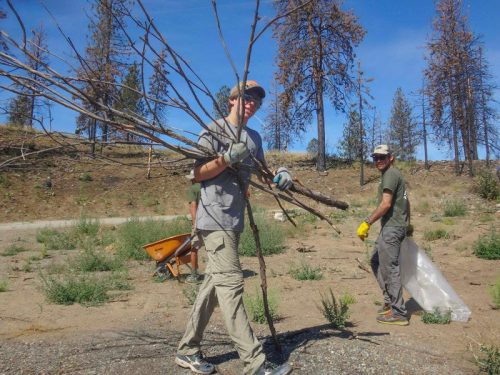
Students complete a service project on a longer course in the Pacific Northwest. Photo by Luke O’Neil.
Are you interested in outdoor adventure and education? Outward Bound falls in this category. Outward Bound Instructors teach outdoor skills as a medium for students to learn more about themselves. It’s an adventurous way to learn life lessons and to grow. If you’d like to instruct for Outward Bound, you’ll join a community of people commited to human development. “You are capable of more than you know,” our founder, Kurt Hahn, often said.
Do you love working with young children? Perhaps you’d like to work in environmental education. Many communities across the country have programs to help children connect wtih the natural world through direct experiences. You might find yourself creekside, looking under rocks for aquatic insects and salamanders in a stream to teach kids about the cycle of aquatic life. Environmental educators help instill a love and understanding of nature in the next generation.
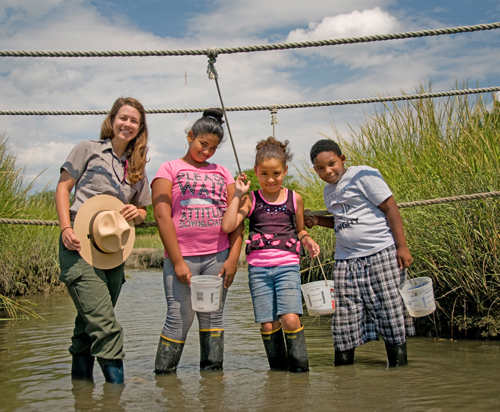
An Outward Bound Instructor works with a group of students in the Boston Harbor
Whether you work in conservation, outdoor adventure, or environmental education, these jobs are likely to get you outside.
3. What lifestyle do you see for yourself over the next few years? Are you ready to settle down in a position that lets you stay in one place, or would you prefer seasonal work that leaves you free to take long climbing trips in the off season, or to work at a ski resort in winter? Do you have a partner whose work requires you to be close to civilization, or would you prefer to live at a remote base camp in a wilderness area? Do you already have a home, or do you need housing?
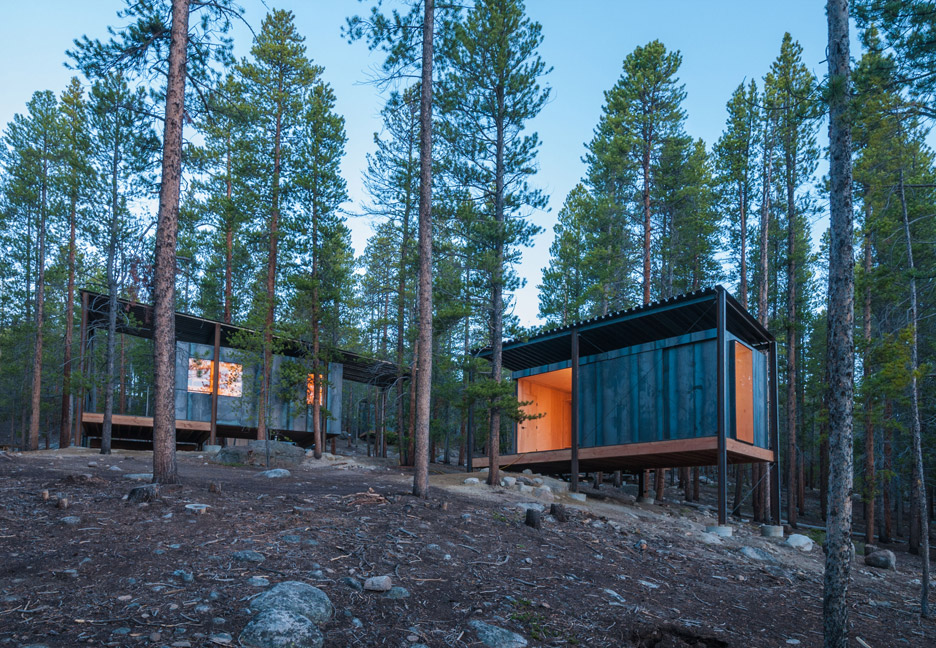
New Instructor cabins at the Colorado Outward Bound School basecamp.
4. What population would you like to work with? There are programs specifically for struggling teens, young children, adults, physically disabled, general population, and veterans. In some jobs you’ll work with a specific population. In others, you might find yourself working with a range of ages or abilities. In outdoor adventure, you could work as a canoe or kayak guide for families on vacation, work at a summer camp for kids, or instruct teens at an outdoor school. Each program or outfitter will work with a specific slice of the population.
5. Conduct a skills assessment.
- What are your current skills?
- Where are the gaps? Do you have a lot of backpacking experience, and not much whitewater paddling in your background?
- Have you done a lot of teaching, but don’t have much experience gearing up for an expedition?
- What skills might you need in order to land the job you’d like to do?
Some jobs require specialized certification, like a captain’s license to lead Outward Bound sailing courses, or avalanche certification to work in the mountains in winter. You can even get certifications in ropes course management or to be a zip line instructor.
At Outward Bound, we look for individuals with both hard skills and soft skills. Hard skills include the basics of campcraft and packing a pack, or navigating with map and compass, as well as more technical skills such as rock climbing and canoeing.
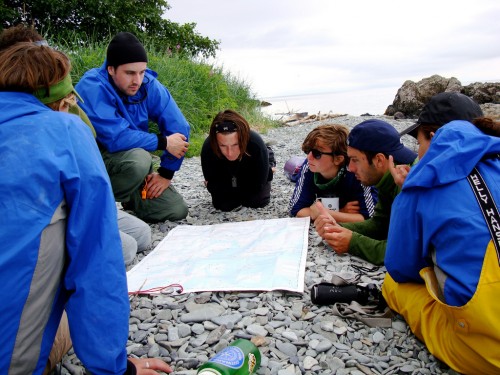
Students keep on track by navigating on course with Outward Bound.
Soft skills are the people skills. These include teaching, faciltating group discussions and team initiatives which teach problem solving, decision making, and conflict resolution. Teaching skills are important in working with groups. Someone may be a strong climber, but have no clue as to how to teach the art and safety skills to a group.
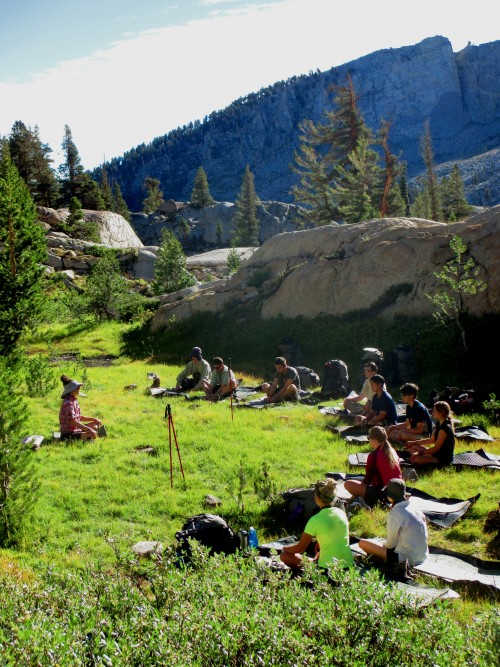
Outward Bound Instructor teaching outdoors on course in the High Sierras.
If you want to become an Outward Bound Instructor, you’ll need a good mix of hard skills and soft skills. One way to gain these is to take an Instructor Development Course. On this course, students begin with a week-long Outward Bound experience as a group, engaging in the dynamics of becoming a new team, learning new skills, and participating in expeditions, solo, and a personal challenge, as on any Outward Bound course. After that, the course curriculum focuses on honing the hard and soft skills needed to teach in that course environment.
On most Outward Bound Instructor Development Courses, you’ll earn a Wilderness First Responder (WFR) certificate. This certification is the accepted standard for most programs which operate in the wilderness, far from base camps. Participants learn how to handle any first aid situation which may arise. And more importantly, they become aware of what CAN happen, and how to prevent accidents and injuries as much as possible. The WFR course is a hands-on experience which can benefit anyone who spends a lot of time in the wilderness and is essential for those who are professionally responsible for others.
Outward Bound Instructor Development Courses are 50-day courses which can jump-start your career by providing a solid foundation for instructing in the outdoors. They are offered in the following regions: Colorado Rockies, Washington, Maine, California, Appalachian Mountains and the Blue Ridge Mountains.
Chicken and Egg
When starting out, it may seem like you need experience to get a job. How do you get that experience?
- Entry level positions don’t require you to be an expert. Consider working behind the scenes in a support role such as a logistics coordinator for an wilderness program or outdoor school. These jobs allow you to get to know the course area, the people, and the systems that support the program. Or, if you have some experience in outdoor activities and teaching, you may qualify to work as an assistant instructor, and gain valuable experience under the wings of an experienced instructor.
- Ask about outdoor internships or other on-the-job training opportunities. These may not pay, but they allow you to get experience, and may include room and board.
- Work at a summer camp to get experience as a leader, working with kids, and developing creative teaching skills.
- Research college outdoor programs. If you’re in college and have the chance to get involved with a degree in experiential education or outdoor education, you may be learning the skills to help you land a job with an outdoor school. Your instructors may be able to help point you in a good direction for your next step.
How to Find Those Jobs?
Use the internet to research your particular interest and direction. Some good places to start include:
- Association for Experiential Education’s Jobs Clearinghouse http://jobsclearinghouse.aee.org/
- NOLS Jobs Network http://www.nols.edu/alumni/employment/jobsnetwork.shtml
- Conservation Job Board http://www.conservationjobboard.com/
- Student Conservation Association http://www.thesca.org/
- Outward Bound Careers http://www.outwardbound.org/about-outward-bound/employment/
Create Your Own Career Map
In many ways, landing a job in the outdoor industry is similar to finding a job in other fields. Networking, skill-building and a good resume all help to land the position you have your eyes on.
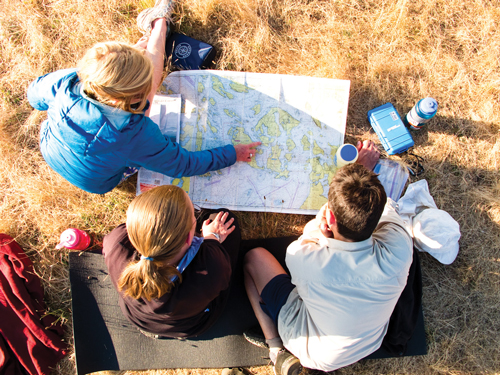
Students navigating while on course. Photo by Joel Reid
Take the time to create your own personal career map, knowing that your personal path may not be on the map yet. Build the skill set for the career direction you’d like to take, navigate it with confidence and care, and enjoy the journey!
About the Author
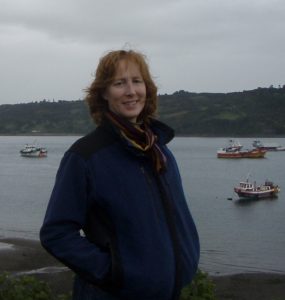
CJ Wilson
In pursuit of a career, CJ Wilson has worn many hats, from Outward Bound instructor and course director, to park ranger, transportation coordinator, writer, team-building facilitator and Spanish interpreter. She finds that a variety of hats makes the wardrobe of life quite interesting.




